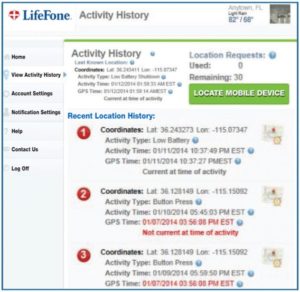Understanding Alzheimer’s
For generations, memory loss and senility were considered part of the normal aging process. Forgetting names, dates and addresses were all seen as part of ‘growing old’. We are now aware that memory loss and confusion can be signs of Alzheimer’s disease. At LifeFone, we understand how important it is to your loved one to age in place, however, we want to make you aware of some of the signs and symptoms, so you can get a clearer understanding of Alzheimer’s.

If you are worried about Alzheimer’s, you aren’t alone. Recently, the Alzheimer’s Association questioned over three thousand American adults about their knowledge, experience and attitudes concerning this disease.
Alzheimer’s disease – the most common form of dementia – affects memory, thinking, and other mental abilities. There is no cure for Alzheimer’s, but there are treatments to manage the symptoms.
Knowing the symptoms and risk factors can help you determine if your loved one is beginning to show signs of early onset Alzheimer’s, or if it’s just natural aging. Alzheimer’s affects everyone differently, but the most common symptom is when a person is struggling to retain new information.
As the disease worsens, other symptoms appear, including:
- Memory loss disrupting everyday life
- Difficulty completely familiar tasks
- Time or place confusion
- Challenges in solving problems or planning
- Difficulty understanding spatial relationship and visual images
- Withdrawing from social activities or work
- Decreased or poor judgement
Risk factors include:
- Advanced age – Most people are diagnosed at 65 or older.
- Family history – People with a first-degree relative – parent or sibling – with Alzheimer’s are more likely to develop this condition.
- Cardiovascular disease risk factors – Recent research indicates that heart and cardiovascular health are linked to brain health. Factors that increase the risk of cardiovascular disease also increase the risk for Alzheimer’s.
- Traumatic brain injury – When a TBI occurs, normal brain function is disrupted by a blow or jolt to the head. Moderate to severe TBI increases the risk of developing Alzheimer’s or dementia.
- Lack of social and cognitive engagement – Some studies suggest that remaining socially and mentally active may help support a healthy brain and reduce the risk of Alzheimer’s and other types of dementia.
- Apolipoprotein (APOE) 4 – The APOE gene provides a blueprint for a protein that carries cholesterol in the bloodstream. Everyone gets one form of this gene – either 2, 3, or 4 – from each parent. Having the number 4 form increases the risk of developing Alzheimer’s, and at a younger age. An estimated 20 to 30 percent of people in the U.S. have the 4 form of the APOE gene.
Whether you believe your loved one is showing symptoms of early onset Alzheimer’s, a medical alert system from LifeFone can offer you peace of mind. We offer tools such as check-in services, medication reminders, daily check in calls, and subscriber location services when they are subscribed to our on-the-go systems. All of our plans have fall-detection included, which is smart for anyone.
